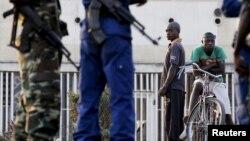The African Union said Friday that it wanted to begin immediate, inclusive talks to end the political crisis in Burundi. At the same time, the East African Standby Force was called upon to prepare in case the situation worsened.
The AU's Peace and Security Council said it would support inclusive talks for the Burundi crisis, while preparing the standby force for a possible intervention.
AU Peace and Security Commissioner Ismail Chergui said dialogue could bring Burundi back to normality.
“As of today, I am sending some of my people to Uganda to really help put in place the necessary requirement to start the dialogue," he said. "We are in full support of the efforts of [Ugandan] President Yoweri Museveni and his team.”
The international community has called on Burundi's government and opposition to take part in the proposed talks. On Friday, opposition group UPRONA welcomed efforts for dialogue but said it hoped that peacekeepers would be deployed soon.
The government has so far not committed to any kind of dialogue.
Meanwhile, the European Union announced that nonessential employees and families of staff were being evacuated from Burundi.
Chergui said contingency plans were being made to send African troops into Burundi if talks failed to stabilize the situation.
“The constitutive act gives us that opportunity. For the time being it’s a contingency planning, but we have to be prepared and really not allow to have a very sad surprise," he said.
The Burundi crisis started in April when President Pierre Nkurunziza decided to run for a third term. Opposition groups claimed it was unconstitutional and boycotted July elections that were won by the sitting president.
Violence in the small nation has killed an estimated 240 people and prompted more than 200,000 to flee to neighboring countries.




